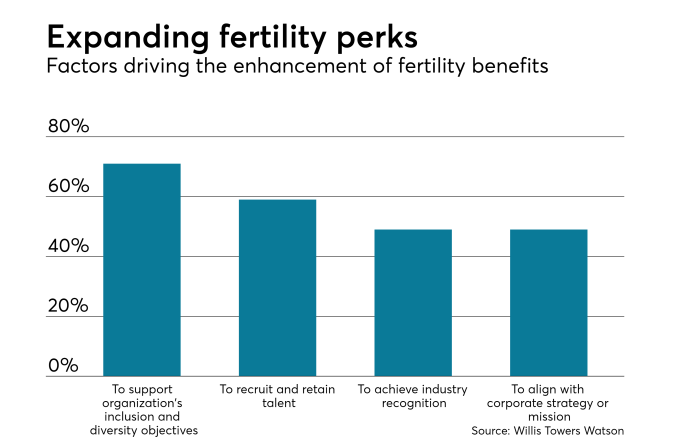
Not too long ago, fertility coverage was a fringe benefit that only companies with the most expansive benefit packages offered. Now, thanks to a more competitive job market and the increased need for employers to offer comprehensive benefits packages, fertility coverage is becoming a more mainstream health benefit.
Here are some key factors driving the increase in company fertility benefits solutions:

Supporting inclusion and diversity objectives. Fertility treatments support nontraditional families and those who cannot otherwise have children.
To recruit and retain talent. With increased competition in the job market, companies have to go above and beyond to offer progressive benefit solutions that would draw in new talent and keep current talent.
To achieve industry recognition. Companies should always be looking for ways to set them apart from their competitors. Earning recognition for being the only company in their industry to offer these progressive benefits solutions can set them apart.
To align with corporate strategy or mission. Lately, a lot of emphasis has been placed on company culture and employee experience. A corporate strategy could be to make the employee experience as positive as possible, including outside of work.
Whatever the driving force behind your clients’ interest in providing fertility benefits, you can play an essential role as a broker. You can help clients understand the benefits, weigh the challenges, and consider all options.
Company-wide benefits
Employees in need of fertility services will benefit the most from this additional coverage. But explaining the other company-wide benefits can make your clients more inclined to add coverage. Here are the top company benefits:
Cost advantage. According to the Society for Assisted Reproductive Technology, women rate the stress of undergoing IVF as the same as significant life events such as a divorce or death of a family member. The time commitment, financial burden, and emotional impact of fertility treatment cause major stress and anxiety. Stress can take a major financial toll on a company—absenteeism rates rise, productivity is lost, and employee turnover skyrockets. Although providing coverage for fertility treatment does not eliminate this stress by any means, it can reduce it enough to lower the impact on a company’s bottom line.
Employee support. Employees going through a severe life event like fertility issues need the utmost support of their employer. This boosts company morale, increases productivity, and creates a more positive overall employee experience.
Things to keep in mind
When adding any new benefit, there are challenges and considerations that have to be taken seriously. Explain these to your clients so they have a full understanding of potential impacts:
Supporting benefits. There are going to be other promoting benefits that will be necessary for employees to go through fertility treatments successfully. For example, mental health and counseling services help manage the stress those in treatment face.
Consider a personal care coordinator. Consistency and personal attention are essential in this situation. Having an employee advocate, like a personal care coordinator, can help support employees through fertility treatment, pregnancy, and returning to work. This gives employees a steady source of support that makes them feel more secure about their decisions.
Provide holistic support. Fertility treatments affect all aspects of a patient’s life. It’s essential that employers provide support and benefits that cater to the physical, mental, and lifestyle requirements of treatment.
Whether or not your client decides to follow the trend of adopting fertility treatment coverage is ultimately up to them and their company’s specific needs. As a broker, however, you can help educate clients about companies with fertility benefits and help them create the best plan for them.
Source:
